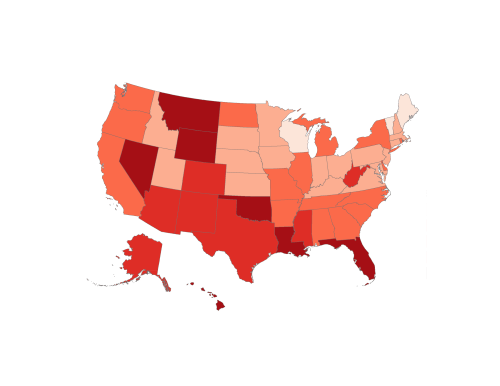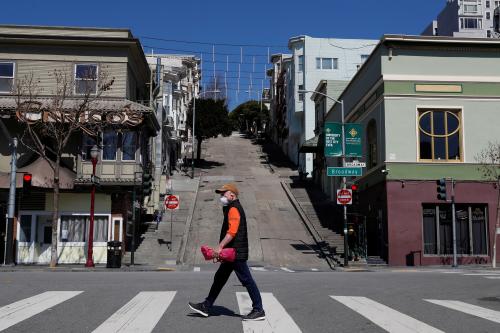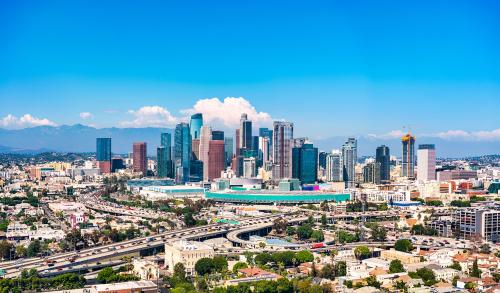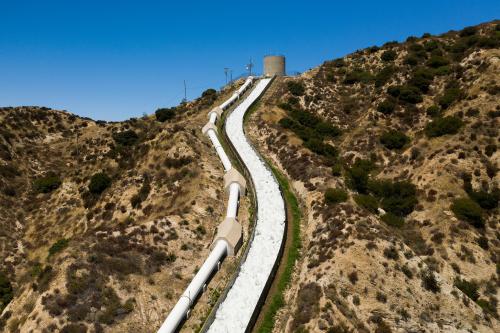Last week, Facebook announced that as many as half of its employees could permanently work from home in the coming years, as the COVID-19 pandemic continues to upend traditional office routines. Twitter was rightly abuzz at the move:
The push happening around remote work is as game-changing for the future of tech as the launch of the iPhone was in 2007. This is not about real estate; it will change how products will be designed, how teams collaborate, and how companies will be run going forward.
— Aaron Levie (@levie) May 21, 2020
Facebook’s announcement, following a similar one from Twitter, may be as important for the nation’s traumatized economic geography as it will be for general office culture. Suddenly, it looks as if the COVID-19 pandemic could allow not just localized telework, but a more fundamental dispersal of America’s highest-value employment away from large “superstar” metro areas and into the lower-priced American heartland.
Such dispersal would be a welcome change. As Brookings Metro and others have stressed, Big Tech—a stand-in for America’s highest-value industries—has been widening the nation’s regional economic divides due to the heavy concentration of its workers in a short list of coastal tech hubs, beginning with the Bay Area.
Based on hyper-intense agglomeration dynamics, Big Tech and the broader innovation sector have generated significant technology gains and wealth for the country. But they also have greatly exacerbated a growing gap between the nation’s superstar cities and most everywhere else.
Neither market forces nor bottom-up economic development efforts have closed this gap. According to Brookings calculations, over one-third of the nation’s digital services job growth in the last decade was concentrated in just five metropolitan areas: New York, Seattle, Boston, San Francisco, and San Jose, Calif.

As a result, growth in other places has been stymied—to the point that just 16 of the country’s 100 largest metro areas managed to increase their share of the nation’s digital services economy by more than a tenth of a percentage point. As for the rest of the nation’s large metro areas, no less than 63 of them saw their share of the tech sector actually decline due to slow or negative growth.
The upshot: Big-tech job concentration—prompted by self-reinforcing agglomeration economies as well as management groupthink—has driven a truly ruinous degree of territorial polarization. Superstar metro areas must contend with skyrocketing home prices, homelessness, and traffic gridlock, while the nation’s left-behind places face economic stagnation and underdevelopment.
This is why the Facebook and Twitter announcements are such a big deal. These companies’ move to permanent remote work is not just a signal that work within cities may soon be reorganized. The announcements could also forecast a degree of tech decentralization across the continent that no amount of real estate appreciation, pleas from heartland leaders, and promises to open branch offices have been able to achieve.
Decentralization has been slow to occur so far, as big coastal hubs like San Francisco and Seattle continue to accumulate tech sector jobs. Yet even if, over a decade, staffing adjustments like Facebook’s shifted just 10% of tech sector employment into towns and cities across America, the change would achieve a genuine benefit for the country.
Such an adjustment would ease the economic costs of tech sector hyperconcentration while reducing the heartland “brain drain” that has left many areas with thinned talent reservoirs. It would bring opportunity closer to people that are otherwise deprived of it because they live in the “wrong” place for dynamic economic growth. And it might begin to tamp down the nation’s simmering distrust of distant, high-tech elites.
If delivered on, Facebook’s plan to allow employees to work outside of expensive, superstar cities really does seem like a watershed moment. Widespread remote work, especially in the tech sector, might very well prompt a degree of geographic healing that would counter decades of economic divergence which have left so many American places and people behind.
The Brookings Institution is committed to quality, independence, and impact.
We are supported by a diverse array of funders. In line with our values and policies, each Brookings publication represents the sole views of its author(s).







Commentary
Could Big Tech’s move to permanent remote work save the American heartland?
May 26, 2020